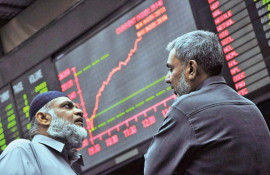
"Oil sector stocks have driven the FTSE lower," said market analyst Alastair McCaig from the IG trading group.
Countering the downward trend, shares in German power giant E.ON soared on the company's plans to spin off its conventional energy operations and focus on renewables.
Oil futures tumbled to their lowest levels for five years, extending last week's sharp sell-off in response to OPEC's decision to maintain output despite a supply glut and plunging prices.
US benchmark West Texas Intermediate (WTI) for delivery in January hit $63.72 a barrel -- the lowest level since July 2009.
Brent crude for January sank to an October 2009 low of $67.53.
"Investors see crude as remaining vulnerable after last week's OPEC announcement," said Michael McCarthy, chief strategist at traders CMC Markets in Sydney.
"We have not yet seen any piece of news or development that could trigger a bottoming-out phase in oil prices," he told AFP.
The unabated price plunge comes after the 12-nation Organization of Petroleum Exporting Countries opted Thursday to keep its collective output ceiling at 30 million barrels per day, where it has stood for three years.
OPEC's powerful Gulf members, led by kingpin Saudi Arabia, resisted the calls from poorer members, including Venezuela and Ecuador, unless they are guaranteed market share, particularly in the United States where rising production of shale oil has contributed to the global glut.
Sliding oil hurts stocks
London's benchmark FTSE 100 index shed 0.78 per cent to 6,669.93 points in afternoon trading.
Frankfurt's DAX 30 lost 0.27 per cent compared with Friday's close to stand at 9,954.40 points and the CAC 40 index in Paris dropped 0.46 per cent to 4,370.19.
"General profit-taking after a stellar November and reassessment of the time frame of possible further action by the ECB is putting pressure on stocks," said Markus Huber, senior analyst at broker Peregrine & Black.
"There is also more disappointing news out of China," he noted.
The slowdown in Chinese growth, and hence oil demand, has also added to downward pressure on oil prices.
Among the biggest fallers were Tullow Oil, which dived 4.7 pe cent to 405.90 pence and miner BHP Billiton, which lost 1.5 per cent to 1,494.50 pence.
Slumping oil prices are adding to worries about slowing eurozone inflation -- a situation that is likely to make the European Central Bank increasingly nervous and pave the way for further monetary easing, according to analysts.
Ruble knocked
In foreign exchange on Monday, the euro rose to $1.2485 from $1.2443 late in New York on Friday.
The European single currency fell to 79.29 British pence from 79.54 pence, while the British pound gained to $1.5746 from $1.5641.
The beleaguered ruble meanwhile hit new record lows, dropping by 8.0 per cent during the session at one point, as sliding oil prices increased worries about the economy in Russia, a major producer of crude.
The ruble has now depreciated by some 40 per cent this year, due not only to falling oil prices but also Western sanctions imposed against Russia's support for a separatist uprising in eastern Ukraine.
On the London Bullion Market, gold slipped to $1,178.75 an ounce from $1,182.75 on Friday.
The metal took a hit after the Swiss on Sunday voted against the idea of their country significantly increasing its gold reserves.
Asian markets mostly fell Monday after China released data pointing to further weakness in its manufacturing sector, but Tokyo hit a seven-year high as the yen slipped against the dollar.
A downgrade of Japan's credit rating by Moody's weakened the yen, which helps the country's exporters, and helped lift Tokyo stocks 0.75 per cent to the exchange's best finish since July 2007.
Elsewhere the slowing Chinese manufacturing raised concerns about the growth outlook.
Sydney sank 1.98 per cent, Seoul fell 0.79 per cent, Shanghai slipped 0.10 per cent, while Hong Kong tumbled 2.58 per cent lower.
US stocks also opened lower Monday on the disappointing Chinese economic data.
Five minutes into trade, the Dow Jones Industrial Average was down 0.28 percent to 17,778.05 points.
The broad-based S&P 500 dropped 0.38 per cent to 2,059.64, while the tech-rich Nasdaq Composite Index 0.24 per cent to 4,779.95.
COMMENTS (1)
Comments are moderated and generally will be posted if they are on-topic and not abusive.
For more information, please see our Comments FAQ

1725877703-0/Tribune-Pic-(5)1725877703-0-165x106.webp)















All Thanks To Saudi Arabia. The one who didn't cut the production. and come to help allies inPakistan And Egypt and Others. And Teaching Lesson to Iran, Russia and there Allies. At this Price Iran will be BankCrupt in two years.